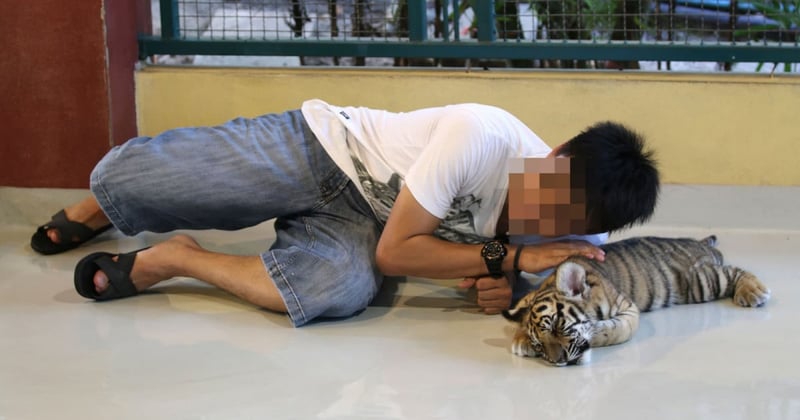
Tinder takes a stand against tiger selfies
News
Swipe through Tinder and it won’t be long before you come across someone posing beside a tiger. But that’s about to change, as Tinder asks its users to take down their tiger selfies.
In great news for tigers, dating app Tinder is cracking down on users posting tiger selfies.
On its blog, Tinder wrote: “It's time for the tiger selfies to go. More often than not, these photos take advantage of beautiful creatures that have been torn from their natural environment. Wild animals deserve to live in the wild.”
Tinder’s move is a step in the right direction to help protect wild animals used for tourist entertainment.
“While on holiday tourists must remember that your once-in-a-lifetime photo opportunity with a wild animal can mean a lifetime of misery for that animal,” said Cassandra Koenen, head of wildlife campaigns at World Animal Protection. “Remember, if you can ride, hug or have a selfie with a wild animal you can be sure it is cruel.”
The hidden cost of your ‘fierce’ selfie
Tiger selfies are not so tough when you realise what goes on behind the scenes.
Last year, our ‘Tiger selfies exposed: a portrait of Thailand’s tiger entertainment industry’ report highlighted the role government, the travel industry and tourists play in the tiger entertainment industry.
The report revealed a rapidly expanding industry. At the time of our investigations, there were more than 830 tigers in captivity at entertainment venues in Thailand, compared to the 623 when we first researched this issue in 2010.
This 33% increase indicated worrying ‘speed breeding’ practices – with no conservation benefit, as tigers are born into lifetimes of suffering in the name of ‘entertainment’.
Welfare concerns for tigers in these venues include:
- Being separated from their mother just two to three weeks after birth
- Being mishandled by tourists hundreds of times a day, leading to stress and injury
- Pain, fear and starvation used to punish tigers for unwanted behaviour
- Small concrete cages or barren enclosures with limited access to fresh water
- Behavioural problems associated with stressful environments.
You can be part of the solution by staying away from any wildlife tourist entertainment venues that allows direct human-animal interaction, such as selfies with tigers or tiger cub feeding.
We recently launched a new way that you can help protect elephants who suffer to entertain tourists. Take a our pledge to Unite for the herd and together, we can show the industry just how many people won’t stand for elephant cruelty in tourism.
While on holiday tourists must remember that your once-in-a-lifetime photo opportunity with a wild animal can mean a lifetime of misery for that animal.